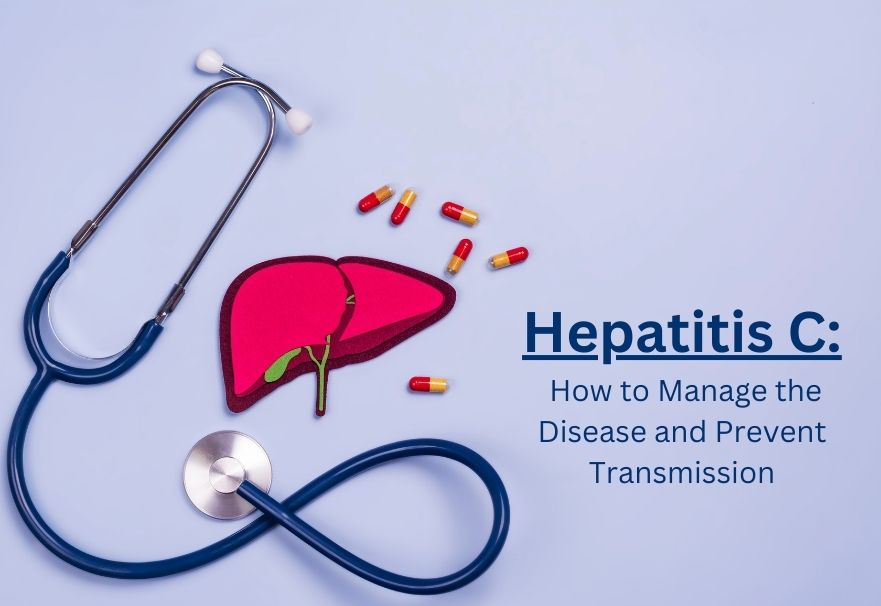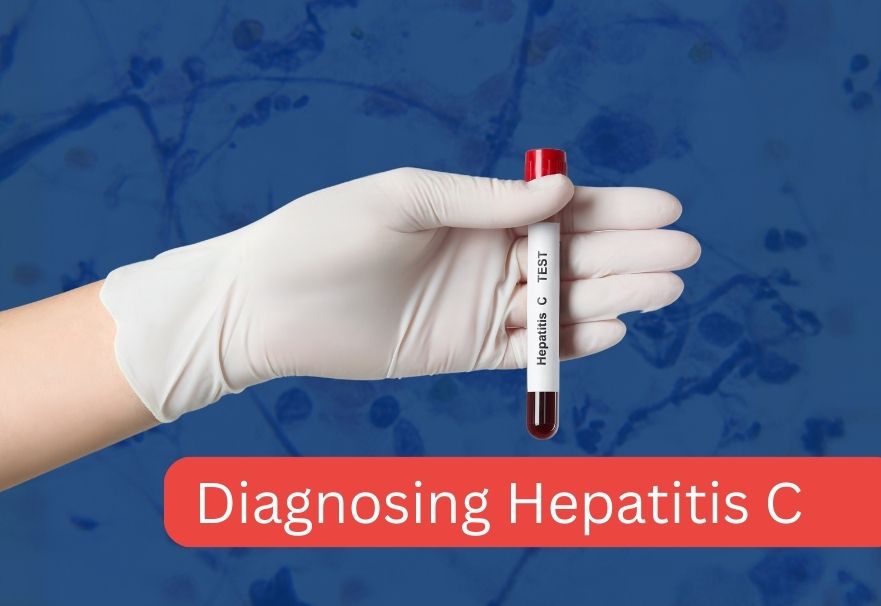Hepatitis C: How to Manage
the Disease and Prevent Transmission

Hepatitis C is a viral infection that affects millions of people worldwide. It is a major public health concern due to its potential to cause chronic liver disease, liver cirrhosis, and even liver cancer. In this comprehensive guide, we will delve into the various aspects of hepatitis C, including its causes, symptoms, diagnosis, treatment options, and prevention measures. Whether you have recently been diagnosed with hepatitis C or are seeking information to protect yourself from this infection, this guide will provide you with the knowledge you need to manage the disease effectively.
What is Hepatitis C?
Hepatitis C is an infection of the liver caused by a contagious virus. HCV (hepatitis C virus) causes it and is transmitted through contact with infected blood. Hepatitis C can be transmitted both acutely and chronically by the virus Acute hepatitis C refers to the initial stage of infection, while chronic hepatitis C occurs when the infection persists for more than six months.
Causes of Hepatitis C
The primary mode of transmission for hepatitis C is through the exchange of infected blood. The most common causes of hepatitis C infection include:
- Injection Drug Use: Sharing needles or other drug paraphernalia with an infected person can lead to the transmission of the virus.
- Blood Transfusions: Prior to widespread screening, blood transfusions were a significant source of hepatitis C transmission. However, with improved testing protocols, the risk has been greatly reduced.
- Needlestick Injuries: Healthcare workers who are accidentally pricked with contaminated needles can contract hepatitis C.
- Mother-to-Child Transmission: Although rare, an infected mother can transmit the virus to her baby during childbirth.
Symptoms of Hepatitis C
In many cases, hepatitis C does not cause noticeable symptoms during the acute phase of infection. However, as the infection progresses, individuals may experience the following symptoms:
- Fatigue and Weakness: Feeling excessively tired and lacking energy is a common symptom of hepatitis C.
- Abdominal Pain: It is possible for some individuals to experience pain or discomfort in their abdominal region.
- Loss of Appetite: Hepatitis C can lead to a decreased desire to eat, resulting in unintentional weight loss.
- Jaundice: Hepatitis C can cause yellowing of the skin and eyes, known as jaundice.
- Dark Urine: Hepatitis C may cause the urine to appear darker than usual.
- Joint Pain: Some individuals may experience joint pain or stiffness as a result of the infection

Diagnosing Hepatitis C
Early diagnosis of hepatitis C is crucial for initiating timely treatment and preventing further liver damage. There are several diagnostic tests used to detect and confirm the presence of hepatitis C.
Blood Tests for Hepatitis C
Blood tests are the primary method for diagnosing hepatitis C. The most common blood tests include:
- HCV Antibody Test: The purpose of this test is to detect hepatitis C virus antibodies. A positive result indicates exposure to the virus but does not necessarily confirm an active infection.
- HCV RNA Test: Also known as the viral load test, this test determines the amount of hepatitis C virus RNA in the blood. A positive HCV RNA test confirms an active infection.
Additional Diagnostic Procedures
In some cases, additional diagnostic procedures may be necessary to assess the extent of liver damage or to determine the most appropriate treatment strategy. These procedures include:
- Liver Biopsy: A small sample of liver tissue is extracted and examined under a microscope to evaluate the degree of liver damage.
- FibroScan: This non-invasive procedure measures the stiffness of the liver, providing an estimate of fibrosis or scarring.
Treatment Options for Hepatitis C
Have Any Question?
Are you looking for a Solution for your problem? You can call us or just drop your question here.
Advancements in medical research have led to highly effective treatment options for hepatitis C. The goal of treatment is to achieve sustained virologic response (SVR), which means the virus is undetectable in the blood six months after completing treatment.
Antiviral Medications for Hepatitis C
Antiviral medications are the cornerstone of hepatitis C treatment. They work by targeting the hepatitis C virus and preventing its replication. The specific medications prescribed depend on the genotype of the virus and the severity of liver damage.
Direct-Acting Antivirals (DAAs)
Direct-acting antivirals (DAAs) are a newer class of medications that have revolutionized hepatitis C treatment. DAAs directly target the virus and have high cure rates with minimal side effects.The most common form of medication is taken orally for a specific period of time, usually between 8 and 12 weeks.
Lifestyle Modifications
In addition to antiviral medications, certain lifestyle modifications can support the treatment of hepatitis C. These include:
- Alcohol Abstinence: Alcohol consumption can worsen liver damage in individuals with hepatitis C. Avoid drinking at all costs.
- Healthy Diet: A well-balanced diet rich in fruits, vegetables, lean proteins, and whole grains promotes overall liver health.
- Regular Exercise: Engaging in regular physical activity can improve liver function and overall well-being.
Prevention and Transmission of Hepatitis C
Preventing the transmission of hepatitis C is crucial in reducing the burden of this disease. By adopting certain preventive measures, individuals can protect themselves and others from contracting the virus.
Preventing the transmission of hepatitis C is crucial in reducing the burden of this disease. By adopting certain preventive measures, individuals can protect themselves and others from contracting the virus.
Needle Exchange Programs and Safe Injection Practices
For individuals who inject drugs, participating in needle exchange programs and practising safe injection techniques can significantly reduce the risk of hepatitis C transmission.
Screening Blood and Organ Donations
Screening donated blood and organs for hepatitis C is essential in preventing the transmission of the virus through transfusions and transplantation.
Safe Sex Practices
While the risk of sexual transmission of hepatitis C is relatively low, it is still important to practice safe sex, including the use of barrier methods such as condoms.
Needlestick Injury Prevention
While the risk of sexual transmission of hepatitis C is relatively low, it is still important to practice safe sex, including the use of barrier methods such as condoms.
Living with Hepatitis C
Being diagnosed with hepatitis C can be challenging, but with the right support and self-care, individuals can lead fulfilling lives.
Support Networks
Joining support groups and seeking guidance from healthcare professionals can provide emotional and practical support for individuals living with hepatitis C.
Regular Monitoring
Regular check-ups and monitoring of liver function are necessary to assess the progression of the disease and ensure early detection of any complications.
Mental and Emotional Well-being
Managing the emotional impact of hepatitis C is essential. Engaging in stress-reducing activities, seeking therapy, and maintaining a positive outlook can contribute to overall well-being.
The Future of Hepatitis C Management
Medical research continues to advance our understanding of hepatitis C, leading to the development of new treatment options and prevention strategies.
Ongoing Research
Ongoing research focuses on developing more effective antiviral medications with shorter treatment durations and fewer side effects.
Vaccines for Hepatitis C
The development of a preventive vaccine for hepatitis C is an ongoing area of research. A successful vaccine would provide long-term protection against the virus, significantly reducing the global burden of the disease.
Conclusion
Hepatitis C is a serious but manageable disease. By understanding the causes, symptoms, diagnosis, treatment options, and prevention measures, individuals can take control of their health and effectively manage hepatitis C. With advancements in medical research and ongoing efforts to raise awareness, the future holds promise for improved outcomes and a world free from hepatitis C.
Stay Connected with
Dr. Vijaykumar C. Bada

Dr. Vijaykumar C. Bada is the best Gastroenterologist in Hyderabad city of Telangana.
- Flexible Appointments & Urgent Care
Dr. Vijaykumar C. Gastroenterologist
Design & Developed by Pointofviewer
Copyright © 2021. All rights reserved.
